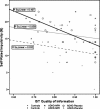Methylphenidate improves response inhibition but not reflection-impulsivity in children with attention deficit hyperactivity disorder (ADHD)
- PMID: 18818905
- PMCID: PMC2704617
- DOI: 10.1007/s00213-008-1337-y
Methylphenidate improves response inhibition but not reflection-impulsivity in children with attention deficit hyperactivity disorder (ADHD)
Abstract
Rationale: Impulsivity is a cardinal feature of attention deficit hyperactivity disorder (ADHD), which is thought to underlie many of the cognitive and behavioural symptoms associated with the disorder. Impairments on some measures of impulsivity have been shown to be responsive to pharmacotherapy. However, impulsivity is a multi-factorial construct and the degree to which different forms of impulsivity contribute to impairments in ADHD or respond to pharmacological treatments remains unclear.
Objectives: The aims of the study were to assess the effects of methylphenidate (MPH) on the performance of children with ADHD on measures of reflection-impulsivity and response inhibition and to compare with the performance of healthy volunteers.
Methods: Twenty-one boys (aged 7-13 years) diagnosed with ADHD underwent a double-blind, placebo-controlled trial of MPH (0.5 mg/kg) during which they performed the Information Sampling Task (IST) and the Stop Signal Task. A healthy age- and education-matched control group was tested on the same measures without medication.
Results: Children with ADHD were impaired on measures of response inhibition, but did not demonstrate reflection-impulsivity on the IST. However, despite sampling a similar amount of information as their peers, the ADHD group made more poor decisions. MPH improved performance on measures of response inhibition and variability of response, but did not affect measures of reflection-impulsivity or quality of decision-making.
Conclusions: MPH differentially affected two forms of impulsivity in children with ADHD and failed to ameliorate their poor decision-making on the information sampling test.
Figures
Comment in
-
Methylphenidate improves response inhibition but not reflection-impulsivity in children with attention deficit hyperactivity disorder (ADHD).Psychopharmacology (Berl). 2009 Mar;203(1):185-6, author reply 187. doi: 10.1007/s00213-008-1386-2. Epub 2009 Jan 10. Psychopharmacology (Berl). 2009. PMID: 19137280 No abstract available.
References
-
- None
- Achenbach TM (1991) Integrative guide to the 1991 CBCL/4–18, YSR, and TRF profiles. Department of Psychology, University of Vermont, Burlington, VT
-
- None
- APA (1994) Diagnostic and statistical manual of mental disorders, 4th edn. American Psychiatric Association, Washington, DC
-
- {'text': '', 'ref_index': 1, 'ids': [{'type': 'DOI', 'value': '10.1016/j.biopsych.2004.10.026', 'is_inner': False, 'url': 'https://doi.org/10.1016/j.biopsych.2004.10.026'}, {'type': 'PubMed', 'value': '15950000', 'is_inner': True, 'url': 'https://pubmed.ncbi.nlm.nih.gov/15950000/'}]}
- Aron AR, Poldrack RA (2005) The cognitive neuroscience of response inhibition: relevance for genetic research in attention-deficit/hyperactivity disorder. Biol Psychiatry 57:1285–1292 - PubMed
-
- {'text': '', 'ref_index': 1, 'ids': [{'type': 'DOI', 'value': '10.1016/S0006-3223(03)00609-7', 'is_inner': False, 'url': 'https://doi.org/10.1016/s0006-3223(03)00609-7'}, {'type': 'PubMed', 'value': '14675812', 'is_inner': True, 'url': 'https://pubmed.ncbi.nlm.nih.gov/14675812/'}]}
- Aron AR, Dowson JH, Sahakian BJ, Robbins TW (2003) Methylphenidate improves response inhibition in adults with attention-deficit/hyperactivity disorder. Biol Psychiatry 54:1465–1468 - PubMed
-
- {'text': '', 'ref_index': 1, 'ids': [{'type': 'DOI', 'value': '10.1037/0033-2909.121.1.65', 'is_inner': False, 'url': 'https://doi.org/10.1037/0033-2909.121.1.65'}, {'type': 'PubMed', 'value': '9000892', 'is_inner': True, 'url': 'https://pubmed.ncbi.nlm.nih.gov/9000892/'}]}
- Barkley RA (1997) Behavioral inhibition, sustained attention, and executive functions: constructing a unifying theory of ADHD. Psychol Bull 121:65–94 - PubMed
Publication types
MeSH terms
Substances
Grants and funding
LinkOut - more resources
Full Text Sources
Medical




